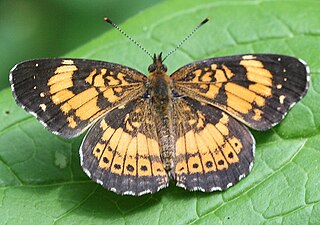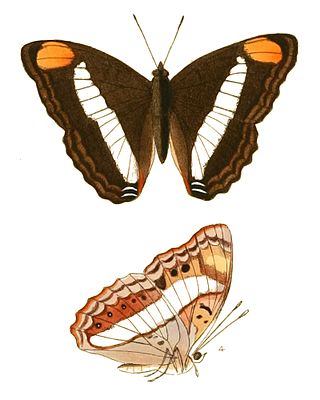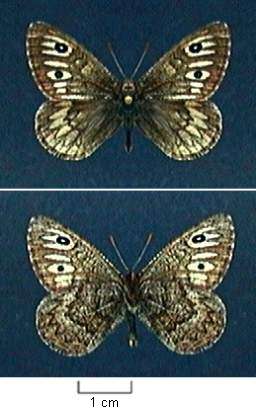
The Nymphalidae are the largest family of butterflies, with more than 6,000 species distributed throughout most of the world. Belonging to the superfamily Papilionoidea, they are usually medium-sized to large butterflies. Most species have a reduced pair of forelegs and many hold their colourful wings flat when resting. They are also called brush-footed butterflies or four-footed butterflies, because they are known to stand on only four legs while the other two are curled up; in some species, these forelegs have a brush-like set of hairs, which gives this family its other common name. Many species are brightly coloured and include popular species such as the emperors, monarch butterfly, admirals, tortoiseshells, and fritillaries. However, the under wings are, in contrast, often dull and in some species look remarkably like dead leaves, or are much paler, producing a cryptic effect that helps the butterflies blend into their surroundings.

Zerene eurydice, the California dogface butterfly, belongs to the family Pieridae and is a sister genus to Colias.The Zerene eurydice and the Colias both share the "characteristic of having yellow-orange and black wing coordination." Additionally the,"Colias and Zerene eurydice males have bright UV patterns on their wings." There are only two species of the Zerene, the Zerene eurydice, and the Zerene cesonia, also known as the Southern dogface. A study that collected mitochondrial DNA from various Colias butterfly species found that Z. eurydice had decreased divergence from the ingroup, highlighting how closely related these two genera are. This species is endemic to California, and is California's state insect. The California dogface butterfly varies in its wing color and pattern.

Mycalesis oculus, the red-disc bushbrown, is a satyrine butterfly found in southern India. It is similar in markings to Mycalesis adolphei but distinguished by the reddish band around the large apical spots on the upper forewings.

Aesculus californica, commonly known as the California buckeye or California horse-chestnut, is a species of buckeye native to California and southwestern Oregon.

Adelpha californica, the California sister, is a species of butterfly in the family Nymphalidae. They are common in California, but can also be found in western Nevada and Oregon, as well as in northern Baja California. The upper surfaces of their wings are dark brown to black with wide cream white bands dissecting both wings and two orange patches near the tips of the forewings. The underside is variously colored with browns, blue, orange, and white. A. californica is unpalatable to predators and is part of a large mimicry complex.

Heteropsis adolphei, the red-eye bushbrown, is a species of satyrine butterfly found in southern India. The species name is after Adolphe Delessert who collected the first specimens based on which the species was described.
William Trowbridge Merrifield Forbes was an American entomologist who specialized in Lepidoptera and Coleoptera.

Chlosyne lacinia, the bordered patch or sunflower patch, is a North and South American butterfly in the family Nymphalidae.

Chlosyne is a genus of butterflies from North and South America in the family Nymphalidae.
Jeane Daniel Gunder was an American entomologist who specialised in butterflies.

Speyeria callippe, the callippe fritillary, is a North American species of butterflies in the brush-footed family Nymphalidae.

Chlosyne leanira, the leanira checkerspot, is a butterfly of the family Nymphalidae. It is found in North America from western Oregon south to California, Nevada, Utah and western Colorado, as well as Baja California. The wingspan is 33–40 mm. Generally, females are larger than males, but males have a more apparent red color to their wings.

Lepidoptera Indica was a 10 volume work on the butterflies of the Indian region that was begun in 1890 and completed in 1913. It was published by Lovell Reeve and Co. of London. It has been considered the magnum opus of its author, Frederic Moore, assistant curator at the museum of the East India Company. Frederic Moore described a number of new species through this publication. Moore was a splitter, known for careless creation of synonyms, sometimes placing the same species in more than one genus.

Charaxes doubledayi, Doubleday's untailed charaxes, is a butterfly in the family Nymphalidae. It is found in Sierra Leone, Ivory Coast, Ghana, Togo, Nigeria, Cameroon, Bioko, the Republic of the Congo, the Central African Republic, the Democratic Republic of the Congo and western Tanzania. The habitat consists of lowland tropical evergreen forests. It is a very rare butterfly

Doxocopa pavon, the Pavon emperor or Pavon, is a species of butterfly in the family Nymphalidae. They can be found from Paraguay in South America up to Texas in the southern United States. They are generally brown in their overall coloration, with two bands of white straddling the middle of the upper surfaces of the wings, and a patch of orange on the tips of their forewings. The upper surfaces of the wings of the males are overlaid by an iridescent blue-purple sheen. The females of the species closely resemble members of the unrelated genus Adelpha.

Adelpha eulalia, the Arizona sister, is a species of butterfly in the family Nymphalidae. It occurs from at least Guatemala and Mexico to the southwestern United States, including southeastern California, Arizona, New Mexico, and southern Texas. They can also sometimes be found in Oklahoma, Kansas, Colorado, Utah, and Nevada.

Neominois ridingsii, or Ridings' satyr, is a species of butterfly in the family Nymphalidae. It is found from southern Alberta, Saskatchewan and Manitoba south to the Guadalupe and Catron counties of New Mexico, and west to the central Sierra Nevada of California and central Oregon. The habitat consists of short-grass prairie, intermountain areas and grasslands with some areas of bare soil.
The Lorquin Entomological Society is a century-old association of professional and amateur entomologists, biologists and naturalists that meet regularly to study and promote entomology and natural history, especially about wildlife in and near Southern California.

Heteropsis davisoni, the Palni bushbrown, is a species of satyrine butterfly found in southern India. Some authors consider this as a subspecies of Heteropsis mamerta or Mycalesis malsara or Mycalesis lepcha.

















